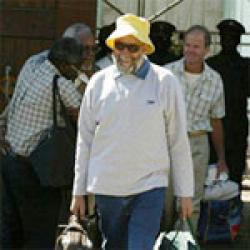Kevin Woods, Michael Smith and Philip Conjwayo were arrested in Zimbabwe in connection with the bombing that killed the driver of the car transporting the bomb and injured several ANC members. Woods, Smith and Conjwayo were sentenced to death and their sentence was later commuted to life imprisonment by the Supreme Court. All three prisoners were former members of the Rhodesian intelligence and security forces. The three were recruited by the South African intelligence service after 1980 to carry out destabilisation activities in Zimbabwe.
In the 1980s Zimbabwe became an important area of operation for the ANC particularly for meetings. The South African government and its surrogates began attacking ANC houses and people in Zimbabwe. For instance in May 1987 Tsitsi Chiliza a Zimbabwean citizen married to an ANC member was killed by a booby trapped television set intended for Jacob Zuma. The ANC office in Harare was hit by a rocket and in January 1988 a car bomb injured three ANC members in Bulawayo. On 21 April 1994 Woods, Smith and Conjwayo were granted South African citizenship by the apartheid government just before the fall of apartheid.
After the fall of apartheid their release became a source of contention between the South African government and the Zimbabwean government. Nelson Mandela failed to persuade the Zimbabwean government to release them on a state visit in 1997 and on other subsequent appeals. Thabo Mbeki who succeeded Mandela as the president of South Africa also failed to secure their release. In 2006 all three were released by the Zimbabwean government on humanitarian grounds. Smith returned to South Africa while Conjwayo chose to stay in Zimbabwe.
